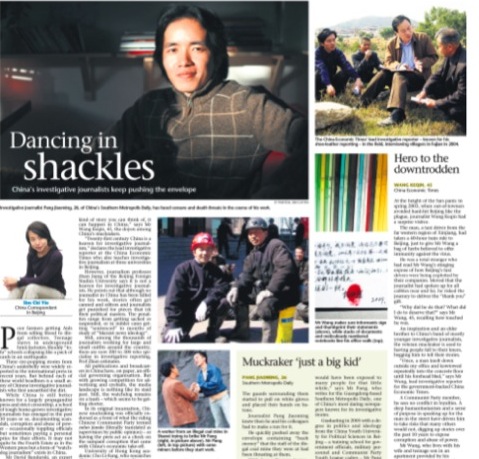Headlines and Hashtags
China's investigative journalists keep pushing the envelope
By David Bandurski — Yesterday’s edition of Singapore’s Straits Times took an in-depth look at the current state and development of investigative reporting in China. The full-page spread included interviews with China Media Project fellows Wang Keqin (王克勤) and Zhan Jiang (展江), as well as a profile of Pang Jiaoming, a young investigative reporter from Guangzhou’s Southern Metropolis Daily.
The feature is fully accessible only to newspaper subscribers, but a portion is available through Lexis Nexis.

[ABOVE: A portion of the Straits Times page on investigative reporting in China.]
A portion of the Straits Times coverage follows:
“Dancing in shackles: China’s investigative journalists keep pushing the envelope“
Sim Chi Yin, China Correspondent
Beijing: Poor farmers getting Aids from selling blood to illegal collectors. Teenage slaves in underground brick factories. Shoddy ‘tofu’ schools collapsing like a pack of cards in an earthquake.
These eye-popping stories from China’s underbelly were widely reported in the international press in recent years. But behind each of these world headlines is a small army of Chinese investigative journalists who first unearthed the dirt.
While China is still better known for a largely propagandist press and strict censorship, a school of tough home-grown investigative journalists has emerged in the past 10 years or so, documenting scandals, corruption and abuse of power – occasionally toppling officials but sometimes paying a personal price for their efforts. It may not quite be the Fourth Estate as in the Western press but a form of ‘watchdog journalism’ exists in China. >>MORE
[Posted by David Bandurski, January 11, 2010, 9:37am HK]






















